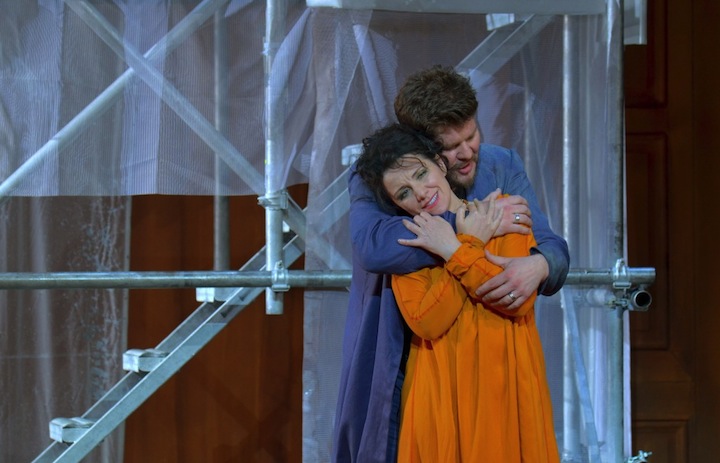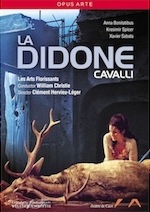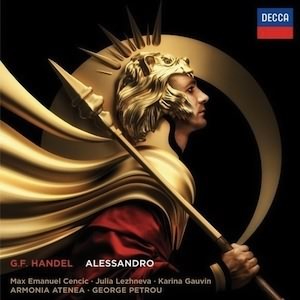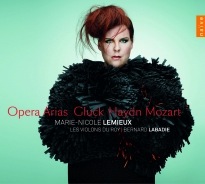
Richard Wagner made such a fuss over the ideal marriage of text, music and staging in opera. But that’s really what any opera composer or performer has wanted to achieve, be it in 1609, 1799 or 2012.
- Classical Music 101: What Does A Conductor Do? - June 17, 2019
- Classical Music 101 | What Does Period Instrument Mean? - May 6, 2019
- CLASSICAL MUSIC 101 | What Does It Mean To Be In Tune? - April 23, 2019
The history of opera is an ongoing pendulum swing that began with the dramatic simplicity of the text at the start of the 17th century in Italy, and gradually became more vocally and instrumentally embellished, then was confronted with a back-to-basics movement in the mid-18th century.
These three albums represent the first, full cycle of that pendulum — and happen to include performers which we have been fortunate enough to see and hear in Toronto.
 LES ARTS FLORISSANTS
LES ARTS FLORISSANTS
Cavalli, La Didone (Opus Arte)
In the superabundance of music in Toronto, there is one thing lacking: Baroque opera — especially this season, as Opera Atelier abandons it in favour of two works from the Classical period.
The pang feels all the stronger in watching tenor Kresimir Spicer, the big star in Opera Atelier’s Der Freischütz (which opens on Saturday) tear up the stage in this fantastic production by Les Arts Florissants of Francesco Cavalli’s 1641 work, La Didone, just released on DVD (and available for paid viewing on medici.tv).
The world has rediscovered the wonders of Claudio Monteverdi, one of the founding creators of opera 400 years ago. But few opera fans know of his student Francesco Cavalli, who wrote about three-dozen operas in Venice before he died in 1676. He even wrote an opera for the elaborate wedding of France’s King Louis XIV — a production in which the monarch gleefully participated as a dancer.
Librettist Francesco Busenello draws the complex, three-act story of defeated Trojans, star-crossed lovers and capricious gods from Virgil’s 2000-year-old epic poem, the Aeneid, but the crux of every twist and turn in the plot is the human heart — in sorrow, jubilation, fear, hope, loathing and resignation.
The 3 hours fly by as an intensely intimate and personal experience.
Cavalli’s genius is in fully reflecting all those roiling emotions in the music, which always places the text first. That makes for a lot of recitative, but when it’s sung and acted this well, one barely misses the fact that there are only occasional short arias and bursts of ensemble singing.
The genius of this production, seen here in the first of several performances in France (this one in Caen a year ago) is how the simple set, streamlined modern costumes and the movement are all at the service of the emotional core of the text and music.
This version of the story has a happy ending. Dido, abandoned by Aeneas (who traipses off to Rome) decides that she will marry Iarbas, whom she had previously turned down. There is nothing in the score to suggest anything other than a deus ex machina-type happy twist on a sad tale, but director Clément Hervieu-Léger cleverly makes this easier for us moderns to take by making it visually clear that this is a desperate move by the abandoned Dido.
Here’s the scene in question, featuring soprano Anna Bonitatibus as Dido and countertenor Xavier Sabata as Iarbas:
The singers are uniformly wonderful and music director William Christie provides impeccable, balanced support with his small period-instrument orchestra.
If you want to see exactly what it takes to make any style of opera magnetically attractive and timeless, look no further.
It’s too bad this release, like most other operas on DVD, provides no background information in video, and minimal notes in the booklet.
For more details on this production and recording, click here.
 ARMONIA ATENEA
ARMONIA ATENEA
G.F. Handel, Alessandro (Decca)
Canadian soprano Karina Gauvin figures prominently in this made-in-Athens recording of George Frideric Handel’s epic take on Alexander the Great.
Neither conductor George Petrou nor Armonia Atenea (formerly Athens Camerata), the resident (period- and modern-instrument) ensemble at the Megaron concert hall in the Greek capital, are well-known here. But that should change with this glorious three-CD album, which also includes countertenor Xavier Sabata from the Arts Florissants production of La Didone.
Handel wrote this opera in 1726 to showcase the arrival of a new Italian star into his King’s Theatre company, soprano Faustina Bordoni. The opera was a smash and received productions in Germany immediately afterwards, but it was largely forgotten after the Italian opera craze faded in the early 1740s.
The libretto, by Paolo Antonio Rolli, focuses not on Alexander the warrior, but on Alexander the conqueror of women, leading to the sort of emotional turmoil that makes for great conflict. (It was in this sort of turmoil with which Handel the savvy impresario wanted to highlight his rival-star sopranos, Bordoni and Francesca Cuzzoni.)
The score is rich and heavily ornamented, filled with Handel’s signature flourishes. The orchestra sounds excellent. The singing cast is a strange mix of voices, some the aural equivalent of freshly churned butter (like Gauvin’s), others a bit more rough-edged. But rather than grating, this mix gives this recording an intriguing edge.
The CD box comes with background notes as well as the complete libretto.
For more details on this recording, officially released today, click here.
Here is the promotional video for the recording:
 MARIE-NICOLE LEMIEUX
MARIE-NICOLE LEMIEUX
Opera Arias (Naïve)
From Baroque fireworks we go to this new album of arias from opera of the late 18th century, sung by that rarest of voices, the true contralto.
Montrealer Marie-Nicole Lemieux presents 10 arias with the help of Les Violons du Roy and their founding conductor Bernard Labadie.
There isn’t a single misplaced note in this celebration of the art of translating deep emotion into music. The album mixes the very well-known with more obscure material, but never at the expense of quality.
Mozart is best represented here, with four arias from four operas, ranging from an affectingly straightforward “Voi, che sapete” from the Marriage of Figaro to the arresting “Venga pur,” from his early Mitridate, re di Ponto. Also on the album are arias from operas by Joseph Haydn, Christoph Willibard von Gluck and the lesser-known Carl Heinrich Graun, who is represented by “Del mio tiranno” from Montezuma.
Les Violons show off their own deft touch in playing modern instruments in a historically informed way in the Overture from Mitridate. But it’s Lemieux who is the main attraction, showing off her warm, supple voice to best advantage — and then surprising us with bursts of passion that raise goosebumps.
This recording, made at the Palais Montcalm in Quebec City, has been sitting idle for two years, due to the poor financial health of Lemieux’s label, Paris-based Naïve. But it was worth the wait.
For more details and audio samples, click here.
+++
Here, to celebrate the huge vocal art of both Lemieux and Gauvin, are the two in more intimate song mode with Michael McMahon, singing Benjamin Britten arrangements of “The Ash Grove” (Gauvin sola) and “Mother Comfort” (in duo):
John Terauds
- Classical Music 101: What Does A Conductor Do? - June 17, 2019
- Classical Music 101 | What Does Period Instrument Mean? - May 6, 2019
- CLASSICAL MUSIC 101 | What Does It Mean To Be In Tune? - April 23, 2019



